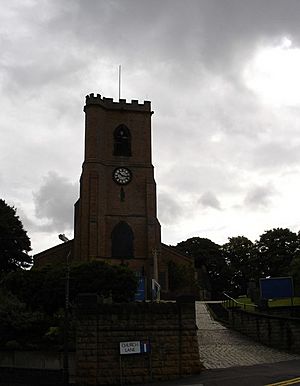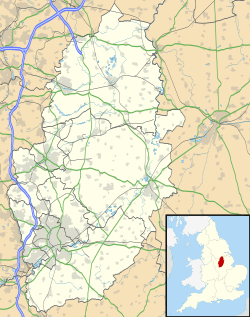Church of St Mary the Virgin and All Souls, Bulwell facts for kids
Quick facts for kids St Mary the Virgin and All Souls, Bulwell |
|
|---|---|

St Mary the Virgin and All Souls, Bulwell
|
|
| 53°00′00″N 1°11′39″W / 52.999932°N 1.194034°W | |
| Location | Bulwell, Nottinghamshire |
| Country | England |
| Denomination | Church of England |
| Churchmanship | High Church |
| Website | www.achurchnearyou.com/church/17960/ |
| History | |
| Dedication | St Mary the Virgin and All Souls |
| Architecture | |
| Heritage designation | Grade II listed |
| Specifications | |
| Length | 126 feet 2 inches (38.46 m) |
| Width | 54 feet 6 inches (16.61 m) |
| Bells | 8 |
| Administration | |
| Parish | Bulwell |
| Deanery | Nottingham North |
| Archdeaconry | Nottingham |
| Diocese | Southwell and Nottingham |
| Province | York |
The Church of St Mary the Virgin and All Souls, Bulwell is a special parish church located in Nottinghamshire, England. It belongs to the Church of England. This church is very important because of its history and unique design. It is officially recognized as a Grade II listed building, which means it's protected for its special architectural or historical value.
History of the Church
This church stands on the same spot where an even older church once was. That first church might have been built as far back as the 1100s! However, a big storm in 1843 caused a lot of damage to it.
So, a new church was built between 1849 and 1850. The architect who designed it was Henry Isaac Stevens. The church was officially opened and blessed on November 4, 1850, by Bishop Kaye of Lincoln. Later, in 1900, a part of the church called the chancel was added by William Arthur Heazell. A north chapel was also added in 1946.
Church Organ
A new organ was first used in the church in 1852. It was played by George Cooper, who was an assistant organist at St Paul's Cathedral. The pipe organ that is in the church today was made in 1872 by a company called Forster and Andrews.
In 1899, a special room called an organ chamber was built. This was to give the organ its own space and move it from where it was originally located in the north transept. You can find more details about this organ on the National Pipe Organ Register.
Church Bells
The church tower holds eight bells. These bells were made by John Taylor and Company of Loughborough. Some of them date back to 1919 or 1920, and others are from 1860.
Church Clock
In 1949, the church's old clock, which was 90 years old, was replaced. A new clock was installed by G. & F. Cope. This new clock had a modern, all-electric system to keep time.
 | Charles R. Drew |
 | Benjamin Banneker |
 | Jane C. Wright |
 | Roger Arliner Young |


